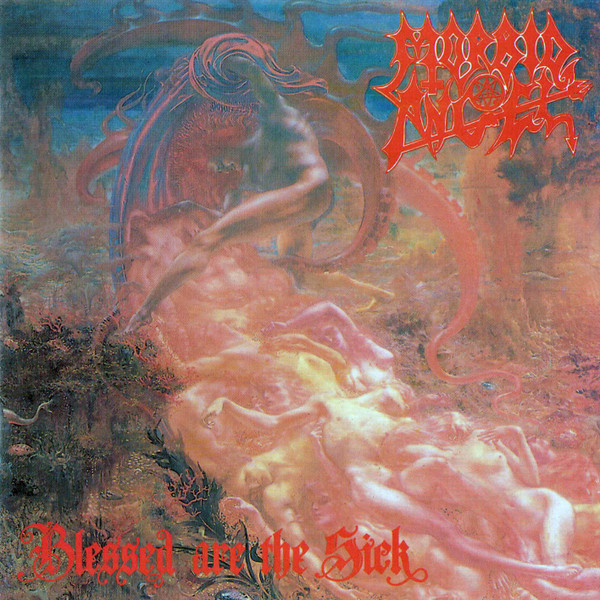A Big Improvement! - 85%
Morbid Angel's second album is leagues better than their debut could ever hope to be. This is due to the band somewhat finding their footing a little. To properly understand the album, it is best to break it down based on each instrument.
First let us start with guitars. The most important change of all is that there is a new, better balance between the slow, galloping riffs and fast tremolo picking that we see on Altars of Madness. On Blessed Are the Sick the split between slow and fast riffs that Morbid Angel had put to use since their earliest days finally matures into a really high-quality formula after they improved their slower riffs. Songs like “Abominations” and “Blessed are the Sick/Leading the Rats” showcase their increased ability to slow down their music while still retaining their brutal sound. This is a skill they would expand upon for pretty much the rest of their career. Regarding Trey’s solos, they start to shed some of their shred-wankery and move toward the sound that they would assume on Covenant, a massive improvement.
Another aspect of Morbid Angel's musicianship that improved vastly was David Vincent's voice. Though he retains his (somewhat improved) Alters-era rasps on songs such as “Brainstorm”, he lowers the pitch of his voice to the form that he would put to use on Covenant and Domination. By far the best part of the album is the song "The Ancient Ones", which embodies everything that Morbid Angel wanted to do on Altars of Madness, but couldn't pull off. The song is notable for having lyrics by Trey Azagthoth, which praise the "ancient ones" as opposed to Vincent's straightforward Satanism. As for the bass on this album, it is nothing particularly special. At one point, I heard it on “The Ancient Ones” and thought it sounded nice. Other than that, there was nothing of significance.
Finally, we have drums. On Blessed Are the Sick, Pete Sandoval slows down his pace, but his overarching style of blast beats and double bass rolls remains essentially unchanged. He may slow down his blast beats and double bass rolls on some songs, but they are still there on all of the main tracks. The production is nice and there is a real low end, though the snare still rings a little bit, perhaps a hang on from the 80s.
Despite all the good things about this album, there are still some problems. In the first place, some of the songs are too short, and don't do much, such as “Day of Suffering” or “Unholy Blasphemies”. Secondly, some of the slower riffs are still under-par, and don't reach their full potential, for example, “Fall from Grace”. The worst parts of the album are the cheesy and unnecessary dungeon synth instrumentals, which take up four full songs, and, for the most part, don't segway into anything, or stand alone as anything special. However, “Desolate Ways”, written by the now deceased Richard Brunelle, serves as a good stand-alone song (Morbid Angel's equivalent of Death's "Voice of the Soul"), and the album intro serves as a good transition into "Fall from Grace". In conclusion, this album marks a huge tempo and quality shift for Morbid Angel, and gives us a taste of what was to come, not only for the Vincent era of the band, but also for the Tucker era.

